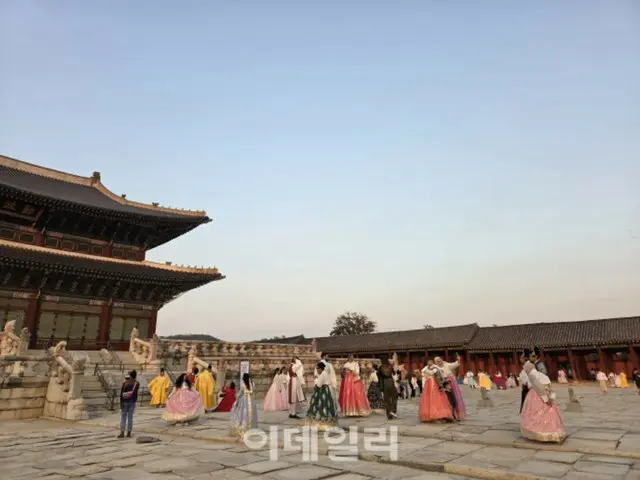In particular, since the tourist police force was abolished last year, their numbers have increased rapidly, creating a truly lawless landscape.
According to an interview with E-Daily on the 13th, there has been an increase in the activities of unlicensed guides at major tourist spots in Seoul recently.
It was confirmed that they were mainly creating accounts on social media posing as legitimate guides, creating products and recruiting tourists. As a result, they were engaging in unreasonable behavior such as eating and drinking at palaces,
There are voices on the ground saying that acts that denigrate Korean culture are rampant. Mr. Kang (32), a tour guide I met at Gyeongbokgung Palace, said, "A fellow guide was once told, 'You just do the interpreting.'
However, in reality, foreigners recruited customers through social media and only conducted shopping-focused tours,” said Kim Jin-oh (55, pseudonym), who mainly guides Thai people.
I often see foreign tour guides eating bento lunches with their guests at palaces, and I've also seen people describing the National Assembly as a 'Muay Thai stadium' and saying that Korean politics is backward."
Furthermore, it was confirmed that rental cars that cannot accommodate the number of tour participants and tour operators without insurance are frequently used, leaving tour operators vulnerable to safety accidents.
Kang Sang-kyun, secretary-general of the association, said, "These days, many people book tours through social media and apps like Airbnb." He added, "It's not difficult to register as a seller here, so we're not doing unregistered businesses."
According to the Tourism Promotion Act, only those who have obtained the qualification of a tourist guide-interpreter can provide tourist guidance to foreigners. In particular, the written exam has four subjects on national history.
This accounts for the largest proportion, at 0%, because it is necessary to accurately convey Korean history to foreigners. Anyone can take the exam, regardless of nationality.
However, the reason why such unlicensed guides are rampant is that proper enforcement is not being carried out.
Under the current law, anyone who provides tour guidance without a license is subject to a fine of 1.5 million won for the first time, and if they are caught repeatedly, the fine increases to a maximum of 5 million won. However, last year, in 2011,
The tourist police force was disbanded for the first time in a long time, enforcement became lax, and an atmosphere of "it's okay to be unlicensed" spread.
Seoul City is working with relevant agencies to crack down on unlicensed guides.
Kim Jin-oh, who was actually at the scene of the crackdown and acted as a Thai interpreter between the authorities and those arrested, said, "Even when we crack down, there are so many people who run away that it's shocking.
"It was an attack," he said. If unlicensed people refuse to write statements and go ahead, there isn't much that can be done. They mainly say things like, "I'm not a customer, I'm a friend," and "I'm the driver, and a licensed guide will be there soon."
"They avoided crackdowns by using excuses like, 'I'm not a tourist,'" Kim said, adding, "Even when I took a photo of the person (the arrested person) holding the tour flag and explaining it on my smartphone, it didn't work."
"As a result, at the scene of the crackdown, we repeatedly saw public officials begging people to please write down statements," he said. Last month, Seoul City conducted a joint crackdown with related agencies.
The police announced that they had conducted an investigation and uncovered six cases of unlicensed guides operating in the Myeongdong and other areas of Seoul, but the actual number of unlicensed guides is likely to be higher.
Experts say the government should seriously consider re-establishing the tourist police.
"The only way to crack down on unregistered businesses that attract customers through social media is on the spot," he said. "The tourist police didn't have the authority to crack down before, but their existence alone is a major deterrent."
He also pointed out the need to establish a separate law for managing guides, as in Japan. He also suggested that a campaign should be launched targeting foreign visitors to Korea.
Professor Kim Nam-jo of the Hanyang University Department of Tourism said, "We need to tell foreigners that they should always use a legal guide when they visit Korea."
One way to do this is to provide them with children and goods to clearly distinguish them from illegal guides."
2025/11/14 10:14 KST
Copyrights(C) Edaily wowkorea.jp 88

